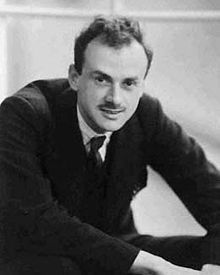In science one tries to tell people, in such a way as to be understood by everyone, something that no one ever knew before. But in the case of poetry, it’s the exact opposite!
I tacked Dirac’s quote onto the bulletin board above my desk, the summer before senior year of high school. I’d picked quotes by T.S. Elliot and Einstein, Catullus and Hatshepsut.* In a closet, I’d found amber-, peach-, and scarlet-colored paper. I’d printed the quotes and arranged them, starting senior year with inspiration that looked like a sunrise.
Not that I knew who Paul Dirac was. Nor did I evaluate his opinion. But I’d enrolled in Advanced Placement Physics C and taken the helm of my school’s literary magazine. The confluence of two passions of mine—science and literature—in Dirac’s quote tickled me.
A fiery lecturer began to alleviate my ignorance in college. Dirac, I learned, had co-invented quantum theory. The “Dee-rac Equa-shun,” my lecturer trilled in her Italian accent, describes relativistic quantum systems—tiny particles associated with high speeds. I developed a taste for spin, a quantum phenomenon encoded in Dirac’s equation. Spin serves quantum-information scientists as two-by-fours serve carpenters: Experimentalists have tried to build quantum computers from particles that have spins. Theorists keep the idea of electron spins in a mental car trunk, to tote out when illustrating abstract ideas with examples.
The next year, I learned that Dirac had predicted the existence of antimatter. Three years later, I learned to represent antimatter mathematically. I memorized the Dirac Equation, forgot it, and re-learned it.
One summer in grad school, visiting my parents, I glanced at my bulletin board.
The sun rises beyond a window across the room from the board. Had the light faded the papers’ colors? If so, I couldn’t tell.
In science one tries to tell people, in such a way as to be understood by everyone, something that no one ever knew before. But in the case of poetry, it’s the exact opposite!
Do poets try to obscure ideas everyone understands? Some poets express ideas that people intuit but feel unable, lack the attention, or don’t realize one should, articulate. Reading and hearing poetry helps me grasp the ideas. Some poets express ideas in forms that others haven’t imagined.
Did Dirac not represent physics in a form that others hadn’t imagined?
Would you have imagined that form? I didn’t imagine it until learning it. Do scientists not express ideas—about gravity, time, energy, and matter—that people feel unable, lack the attention, or don’t realize we should, articulate?
The U.S. and Canada have designated April as National Poetry Month. A hub for cousins of poets, Quantum Frontiers salutes. Carry a poem in your pocket this month. Or carry a copy of the Dirac Equation. Or tack either on a bulletin board; I doubt whether their colors will fade.
*“Now my heart turns this way and that, as I think what the people will say. Those who see my monuments in years to come, and who shall speak of what I have done.” I expect to build no such monuments. But here’s to trying.



